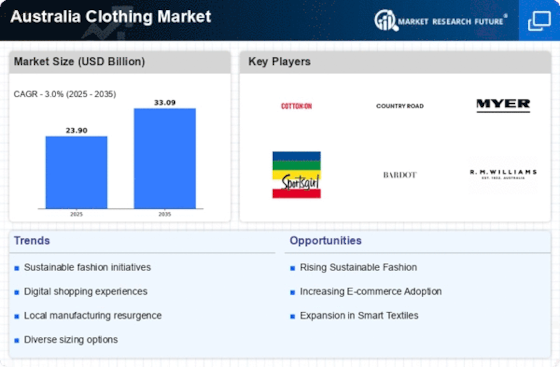Top Industry Leaders in the Australia Clothing Market

Factors influencing market share analysis in the Australian clothing market encompass a wide range of elements, including pricing strategies, product quality, distribution channels, and customer service. Companies that effectively leverage these factors often secure larger market shares by attracting and retaining a loyal customer base. Additionally, brand reputation and customer perception play a significant role in shaping market dynamics, as consumers tend to gravitate towards brands that align with their values and lifestyle preferences.
Amidst the established players, new and emerging companies have been steadily making their mark in the Australian clothing market. These companies often differentiate themselves through niche offerings, sustainable practices, or innovative business models. For instance, companies like Assembly Label and RYDER have gained traction by emphasizing minimalist designs and sustainable materials, catering to the growing demand for ethical fashion choices among consumers.
Industry news reflects ongoing trends and developments within the Australian clothing market, including shifts in consumer behavior, regulatory changes, and technological advancements. For example, the rise of e-commerce has reshaped the retail landscape, prompting traditional brick-and-mortar retailers to expand their online presence to remain competitive. Additionally, sustainability has emerged as a key focus area for many clothing brands, driven by increasing consumer awareness and demand for eco-friendly products.
Current company investment trends in the Australian clothing market highlight a growing interest in digitalization, sustainability, and omnichannel retail strategies. Companies are investing in technologies such as artificial intelligence and data analytics to enhance customer experiences, optimize inventory management, and personalize marketing efforts. Moreover, there is a noticeable trend towards sustainability, with companies investing in eco-friendly materials, ethical sourcing practices, and transparent supply chains to appeal to socially conscious consumers.
Overall, the competitive scenario in the Australian clothing market is characterized by intense rivalry among established players, as well as the emergence of new and innovative companies seeking to disrupt traditional norms. Success in this market hinges on a combination of factors, including product differentiation, brand positioning, operational efficiency, and agility in responding to evolving consumer trends. As companies navigate these challenges and opportunities, those that can adapt quickly and innovate effectively are likely to thrive in this competitive landscape.
Key Companies in the Clothing Market Include –
- Nike Inc.
- VF Corp
- Adidas AG
- Hanesbrands Inc.
- Levi Strauss & Co.
- Kering SA
- Under Armour Inc.
- Mitsui
- Berkshire Hathaway Inc.
- Itochu Corp.











